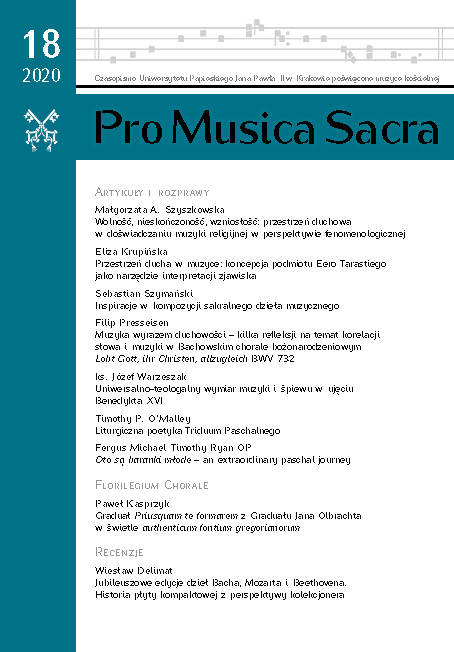Music as a manifestation of spirituality – a few reflections on the correlation between a word and music in Bach’s Christmas chorale Lobt Gott, ihr Christen, allzugleich BWV 732
DOI:
https://doi.org/10.15633/pms.3709Keywords:
Bach, chorale, Gregorian chorale, protestant chorale, song, evangelical song, Lutheran song, prosody, rendition, word, singing, translationAbstract
This paper is an attempt to find the specific word‑and‑music interrelations in Bach’s organ chorale Lobt Gott, ihr Christen, allzugleich BWV 732. The starting point is the quotation by the composer originated from his Bible in which he described the music as “pious.” Since the examined piece is an arrangement of the Lutheran song based on the melody of the introit Puer natus est nobis, the verses of the first stanza have been confronted with a Gregorian antiphon. In effect, a chiasm has been found, noticeable in the combination with Bach’s arrangement of the third and fourth verses. The applied method of analyzing the mutual interrelations between words and music allows to observe in further parts of the paper the astounding compatibility of compositional techniques with particular words and syllables to demonstrate at the same time a high degree of difficulty in translating lyrics into other languages.References
Augustyn z Hippony, Wyznania, tł. Z. Kubiak, Kraków 2018.
Bach J. S., Orgelwerke, Bd. 3: Die einzeln überlieferten Orgelc
The Cambridge Companion to Bach, ed. J. Butt, Cambridge 1997.
Dean L., Vale G. L., Laland K. N., Flynn E. G., Kendal R. L., Human cumulative culture: a comparative perspective, „Biological reviews” 89 (2014) issue 2, s. 284–301.
Dola T., Marcina Lutra soteriologiczna teoria „radosnej wymiany i konfliktu”, „Studia Oecumenica” 17 (2017), s. 133–147.
Forkel J. N., Über Johann Sebastian Bachs Leben, Kunst und Kunstwerke, Lipsk 1802.
Georgiades T., Music and language. The Rise of Western Music as Exemplified in Settings of the Mass, Cambridge 1982.
Graduale Novum, Regensburg 2011.
Klavierbüchlein für Wilhelm Friedemann Bach, Hrsg. W Plath, Kassel 1962.
Küster K., Musik im Namen Luthers. Kulturtraditionen seit der Reformation, Kassel 2017.
Liederkunde zum Evangelischen Gesangbuch, Hrsg. G. Hahn, J. Henkys, Bd. 13, Göttingen 2005.
Pelikan J., Bach wśród teologów, tł. E. Sojka, Katowice 2017.
Pilch M., Chorał protestancki – historia, próby definicji oraz konteksty pojęcia, „Notes Muzyczny” 2017 nr 2, s. 49–76.
Piqué Collado J., Teología y música. Una contribución dialéctico‑trascendental sobre la sacramentalidad de la percepción estetica del misterio, Roma 2006.
Rogall G. F., Hartung J. H., Wasiański J., Nowo wydany Kancyonał Pruski: Zawieraiący w sobie Wybor Pieśni Starych i Nowych, Z ziemi Pruskiey i Brandenburskiey zwyczaynych, https://jbc.bj.uj.edu.pl/dlibra/publication/91645/edition/85236/content (6.05.2020).
Sawicki B., W chorale jest wszystko, Kraków 2014.
Stevenson R., Protestant church music in America. A short survey of men and movements from 1564 to the present, Norton 1970.
Śpiewnik ewangelicki, Bielsko‑Biała 2002.
Walther J. G., Musicalisches Lexicon oder Musicalische Bibliothec (Leipzig 1732), Faksimile, Kassel 2001.
Williams P., The Organ Music of J. S. Bach. II – Works based on Chorales, Cambridge 1980.
Zasady pisowni słownictwa religijnego, red. R. Przybylska, W. Przyczyna, Tarnów 2004.
Downloads
Published
Issue
Section
License
Copyright (c) 2020 Filip Presseisen

This work is licensed under a Creative Commons Attribution 4.0 International License.
Authors who publish with this journal agree to the following terms:
- Authors retain the copyright and full publishing rights without restrictions, and grant the journal right of first publication with the work simultaneously licensed under a Creative Commons Attribution 4.0 International License that allows others to share the work with an acknowledgement of the work's authorship and initial publication in this journal.
- Authors are able to enter into separate, additional contractual arrangements for the non-exclusive distribution of the journal's published version of the work (e.g., post it to an institutional repository or publish it in a book), with an acknowledgement of its initial publication in this journal.
- Authors are permitted and encouraged to post their work online (e.g., in institutional repositories or on their website) prior to and during the submission process, as it can lead to productive exchanges, as well as earlier and greater citation of published work (See The Effect of Open Access).

